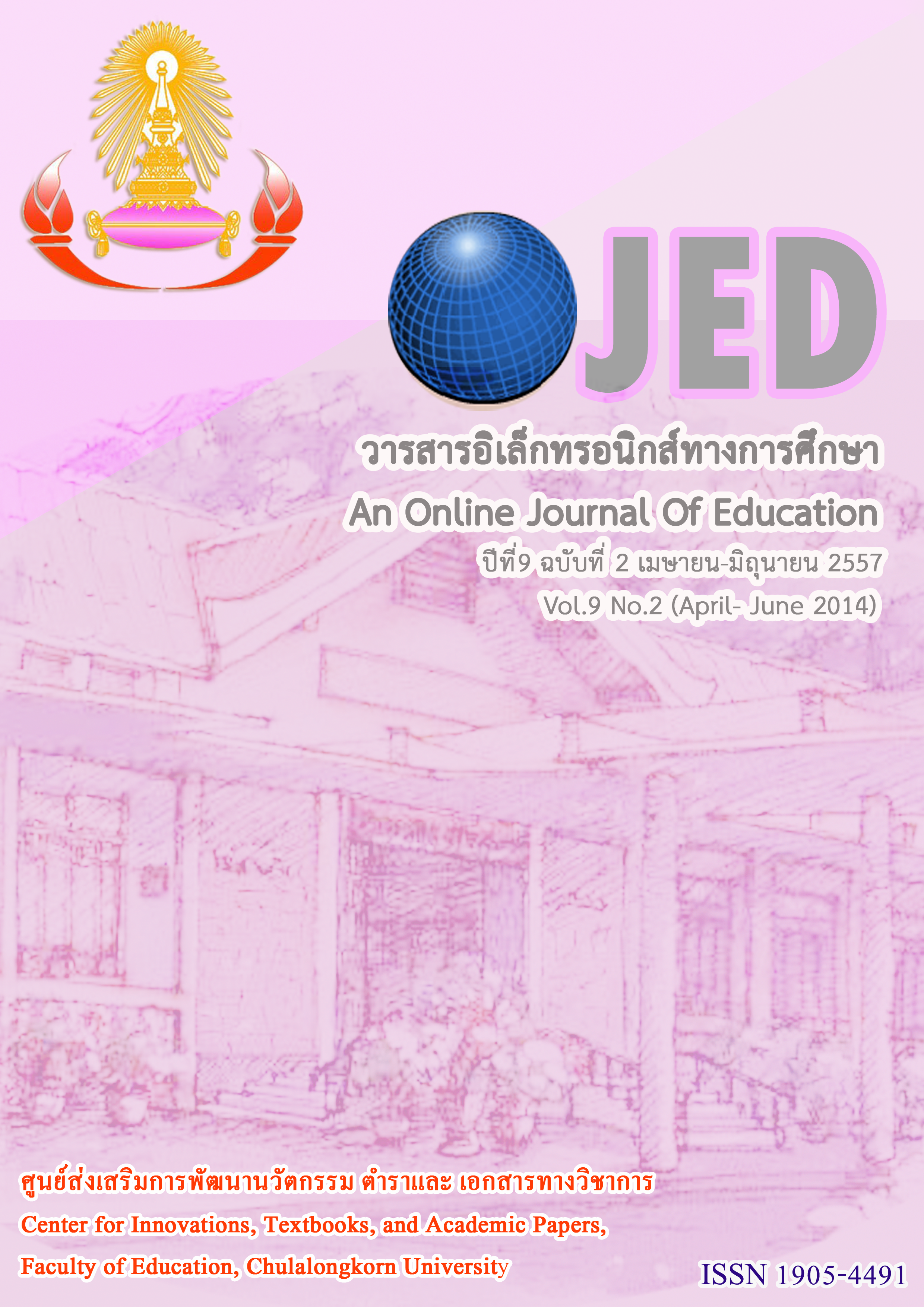แนวทางการเสริมสร้างจิตสำนึกด้านการอนุรักษ์พลังงานของเยาวชน
Keywords:
จิตสานึก, กระบวนการเสริมสร้างจิตสานึก, เยาวชน, การอนุรักษ์พลังงาน, จิตสำนึกด้านการอนุรักษ์พลังงาน, CONSCIOUSNESS, ENERGY CONSERVATION CONSCIOUSNESS PROCESS, YOUTH, ENERGY CONSERVATION, ENERGY CONSERVATION CONSCIOUSNESSAbstract
บทคัดย่อ
การวิจัยมีวัตถุประสงค์ 1) เพื่อศึกษากระบวนการเสริมสร้างจิตสานึกด้านการอนุรักษ์พลังงานของเยาวชนและ 2) เพื่อนำเสนอแนวทางการเสริมสร้างจิตสานึกด้านการอนุรักษ์พลังงานของเยาวชน ทำการเก็บข้อมูลโดยใช้ระเบียบวิธีวิจัยแบบผสมคือการวิจัยเชิงสำรวจด้วยแบบสอบถามกับเยาวชนที่ได้รับรางวัลดีเด่นด้านการอนุรักษ์พลังงานในสถานศึกษา 6 แห่ง การวิจัยภาคสนามด้วยการสังเกตและการสัมภาษณ์เชิงลึกกับเยาวชนแกนนำและผู้ที่มีส่วนเกี่ยวข้องในด้านการอนุรักษ์พลังงานของเยาวชน
ผลการวิจัยพบว่า 1) กระบวนการเสริมสร้างจิตสานึกด้านการอนุรักษ์พลังงานประกอบด้วย5ขั้นตอนคือ (1)การขัดเกลา (2)การสร้างความคิด (3)การเสริมทัศนคติ (4)การปฏิบัติ (5)การประเมินผล ส่วนปัจจัยในการเสริมสร้างจิตสานึกซึ่งจำแนกได้ 2 ประเภทคือปัจจัยภายใน ได้แก่ ความคิด ทัศนคติ พฤติกรรมและการรับรู้ ปัจจัยภายนอกได้แก่โอกาสและการเข้าถึง แรงจูงใจ งบประมาณ นโยบาย ตัวอย่าง การมีส่วนร่วม เวลา การบริหารของหน่วยงาน การพัฒนาบุคลากรและการจัดการเรียนรู้ 2) แนวทางการเสริมสร้างจิตสำนึกด้านการอนุรักษ์พลังงานของเยาวชนนั้นได้แก่การกำหนดนโยบายจากระดับประเทศลงสู่ระดับชุมชน เน้นการมีส่วนร่วมจากทุกภาคส่วนของสังคม เสริมแรงจูงใจเพื่อกระตุ้นการเข้าร่วม จัดการเรียนรู้โดยเน้นเยาวชนเป็นศูนย์กลางให้ได้สัมผัสลงมือปฏิบัติจริง บูรณาการเรื่องการอนุรักษ์พลังงานกับเนื้อหาวิชาเรียนในทุกกลุ่มสาระ พัฒนาบุคลากรในการให้ความรู้และจัดกิจกรรม ปรับปรุงสื่อและกิจกรรมและสร้างเครือข่ายการอนุรักษ์พลังงานเพื่อให้เกิดการเสริมสร้างจิตสำนึกด้านการอนุรักษ์พลังงานอย่างต่อเนื่องและยั่งยืน
คำสำคัญ: จิตสานึก / กระบวนการเสริมสร้างจิตสานึก / เยาวชน / การอนุรักษ์พลังงาน / จิตสำนึกด้าน การอนุรักษ์พลังงาน
Abstract
The purposes of this research were: 1) to study the youth’s energy conservation consciousness promotion process; and 2) to propose guidelines for the promotion of youth’s energy conservation consciousness. This mixed method research study comprised a survey of youths studying in the recipient schools of energy conservation awards by means of questionnaires and a field study by means of observation and the in-depth interviews of youth leaders and concerned individuals regarding youth energy conservation.
It was found that: 1) The energy conservation consciousness process consists of five stages, i.e. (1) orientation (2) formation of thoughts (3) enhancement of attitudes (4) practices and (5) evaluation. The two factors involved in the promotion of consciousness are: 1) internal, i.e. thoughts, attitudes, behavior, and perception and 2) external, i.e. opportunities and accesses, motivation, budget, policies, example, participation, time, organization administration, personnel development, and learning management. 2) The guidelines for the promotion of youth energy conservation consciousness are: (1) top down policy making, from national to community levels, with an emphasis on the participation of all social sectors, (2) motivation enhancement for participation activation, (3) youth-centered instruction for real practices, (4) integration of energy conservation into the contents of all learning strands, (5) personnel development, enabling them to provide knowledge and organize activities, (6) revision of media and activities, 7) establishment of energy conservation networks for the promotion of continual and sustainable energy conservation consciousness
Keywords: CONSCIOUSNESS / ENERGY CONSERVATION CONSCIOUSNESS PROCESS / YOUTH / ENERGY CONSERVATION / ENERGY CONSERVATION CONSCIOUSNESS




